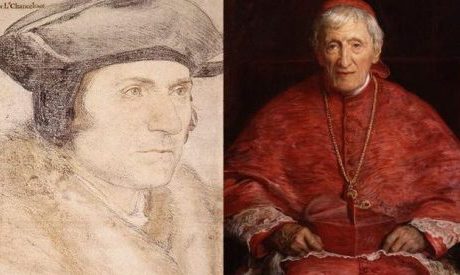St. Thomas More and Blessed John Henry Newman may not on first glance seem to be a good pairing: the twice-happily married lawyer and public servant and the celibate Oxford Fellow and Oratorian priest.
The sixteenth century Catholic martyr and the nineteenth century convert and confessor; the witty teller of merry tales and the seemingly sensitive controversialist.
With a second glance, the viewer sees what they share: Both of them were born in London (actually in the City of London); both attended the University of Oxford; if More was “made for friendship” in Erasmus’s famous line, Newman selected “Cor ad cor loquitor” (Heart speaks to heart) for his motto as Cardinal, emphasizing the bonds of friendship and personal influence.
They shared a desire for holiness and seeking out truth; they are both Catholic (More by birth and nurture in a Catholic family; Newman by adult conversion); More and Newman defended the truth with their pens, taking on the subjects of their day (heresy’s attack on Catholic teaching in More’s era; liberalism’s attack on religious truth in Newman’s).
Most importantly, for both of them, the true Catholic understanding of conscience was crucial in their lives.
For More, following his conscience led him to martyrdom; for Newman, following his conscience led him to become a Catholic.
More and Newman revealed their understanding of conscience’s purpose, authority, and source in defense of the authority of the Church’s magisterium and the role of the papacy in the Catholic Church.
While they are often cited as defenders of individual conscience, they also stressed the source of conscience’s authority in each individual: God’s law, natural and revealed—and the Church’s role in teaching and defending that law.
By what authority?
Rather than consulting Robert Bolt’s A Man for All Seasons or Hilary Mantel’s Wolf Hall, Catholics would do well to read St. Thomas More’s own words about conscience and authority in his letters and other works.
In For All Seasons: Selected Letters of Thomas More (Scepter Publishers), edited by Stephen Smith or The Last Letters of Thomas More, edited by Alvaro de Silva (Eerdmans), readers may grow to appreciate how convinced More was that his conscience, responding to Catholic teaching, was leading him in the right direction. Continue reading
Source and Image:
- The Catholic World Report, article by Stephanie A. Mann, the author of Supremacy and Survival: How Catholics Endured the English Reformation.
